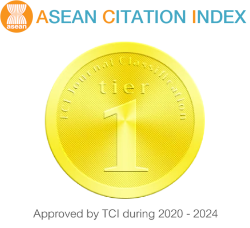Evaluating the Cost Efficiency of Refilling Medicines at the Chiangrai Prachanukroh Hospital Pharmacy Network
Keywords:
efficiency, refill medicines at pharmacy, overcrowding, waiting timeAbstract
Background and Rationale: Chiangrai Prachanukroh Hospital implemented a project aimed at reducing congestion and waiting times for patients with chronic non-communicable diseases by enabling them to obtain medications from local pharmacies. This initiative service model 1 allows participating hospital procuring and dispensing medications for individual patients and delivering them to patients at partnered pharmacies (network). The objective of this study was to evaluate of efficiency of service model 1 from the hospital's perspective.
Methodology: A descriptive study was conducted using data collected from the hospital’s information system spanning the fiscal years 2020 to 2023. The cost efficiency focused on total management and delivery costs per prescription, complemented with the reliability cost incurred from medication returns and errors. The system's capacity to manage medication distribution for variety of diseases was another complementary indicator.
Results: From 2020 to 2023, there were 36,415 prescriptions dispensed through partnered pharmacies, equivalent to 8.7% of all prescriptions (4.5% of during office hours and 43.3% of after-hours). Most services served the patients of the universal coverage scheme. Cost analysis revealed a reduction in dispensing costs from 105.50 THB in 2020 to 41.23 THB in 2023, attributed to saving in overtime wages, despite a cost rise from the medication return rate of 2.5% in the most recent year. The service model demonstrated improved cost efficiency, but not covered the reimbursement of 49 THB per prescription set by the National Health Security Office. The distribution capacity covered conditions such as glaucoma, hypertension, hyperlipidemia, diabetes, and chronic kidney disease.
Conclusion: Future policy considerations should address adequate reimbursement rates to cover costs and promote integrated services to optimize resource utilization and health outcomes. These adjustments will help ensure the financial sustainability of the initiative and enhance the quality of healthcare delivery.
References
Khampang R, Tantivess S, Leelahavarong P, Yanpiboon P, Ponragdee K, Yangtisan A, et al. An evaluation of the pilot program on drug-dispensing services in pharmacies to reduce hospital congestion phase II. Research report. Nonthaburi: Health Systems Research Institute; 2021. (in Thai)
Chaiyasong S, Hadwiset J, Taratai K, Srimongkol P, Kalapat R. Developmental evaluation of the pilot program on drug-dispensing services in pharmacies to reduce hospital overcrowding phase II, Mahasarakham Province. Research report. Nonthaburi: Health Systems Research Institute; 2021. (in Thai)
Olson PS, Sripong P, Kanjanasilp J, Suttriruksa S, Seesin T, Potisarach P, et al. Developmental evaluation of a pilot program to reduce overcrowding at Roi Et Hospital by allowing patients to receive medications from nearby pharmacies. Research report. Nonthaburi: Health Systems Research Institute; 2021. (in Thai)
National Health Security Office. Announcement of the National Health Security Office: Regarding the payment of additional healthcare service costs for referral units specializing in pharmacy. The Royal Government Gazette Volume 140, Special Section 63 Ngor. (Mar 17, 2023). (in Thai)
Kitikannakorn N, Detchit P, Wattanasombat S, Sunanta N. Development of performance efficiency evaluation indicators for the medicine reception at drugstore program in the context of a central hospital network. Thai J Hosp Pharm 2023;33(2):154-70. (in Thai)
Srivanichakorn S. Review of health system reform in Singapore. Research report. Nonthaburi: Health Systems Research Institute; 2000. Report No. hs0673. (in Thai)
Khoo HS, Lim YW, Vrijhoef HJ. Primary healthcare system and practice characteristics in Singapore. Asia Pac Fam Med. 2014 Jul 19;13(1):8. doi: 10.1186/s12930-014-0008-x.
Lochid-amnuay S, Kessomboon N, Puttasri W, Puangkantha W. Recommendations on incorporating accredited community pharmacy into universal coverage in Thailand. Thai J Hosp Pharm 2011;(21)3:189-202. (in Thai)
Srithamrongsawat S. Health care reform in Korea. Research report. Nonthaburi: Health Systems Research Institute; 2000. (in Thai)
Kwon S, Lee Tj, Kum Cy. Republic of Korea health system review. Manila: World Health Organization Regional Office for the Western Pacific; 2015. 102 pages.
Al-Worafi Y.M. Quality of hospital pharmacies services in developing countries: status and future recommendations [internet]. United Arab Emirates: Springer Cham; 2024 [cited 2024 Sep 6]. Available from: https://link.springer.com/referencework/10.1007/978-3-030-74786-2.
Downloads
Published
How to Cite
Issue
Section
License
Copyright (c) 2024 Journal of Health Systems Research

This work is licensed under a Creative Commons Attribution-NonCommercial-NoDerivatives 4.0 International License.
Journal of Health Systems Research is licensed under a Creative Commons Attribution-NonCommercial-NoDerivatives 4.0 International (CC BY-NC-ND 4.0) license, unless otherwise stated.




